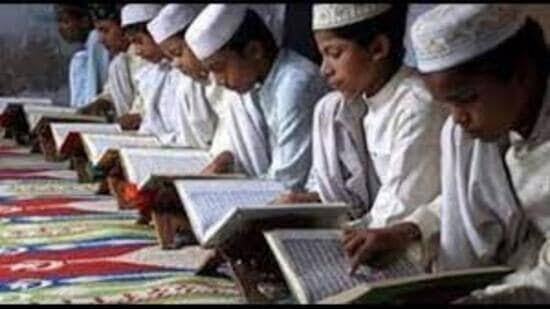The recent conflict over the Madarsa Act, struck down on secular grounds, highlights rising
discrimination against Islamic Institutions in India. The SC ruling, though a relief, doesn’t discount the
growing hostility.
All governments affect education, but a totalitarian government disguised as a democracy does
that in the most detrimental way. It is easy to marginalize minority groups when the government
frames every unfavorable policy as a step towards equality, benefiting a majority that already
holds significant power. India has been no stranger to such circumstances. Over the past few
years, the Indian education curriculum has gone through several alterations. From the
infamously contentious New Education Policy 2020 to the controversial removal of chapters
Based on the Mughal empire from the Class 12th NCERT syllabus of history, the Indian education system has been victim to the very active saffron agenda. Another evidence for the
claim comes forward as we look into the recent case involving the Madarsa Act.
The Uttar Pradesh Board of Madarsa Education Act, 2004 (Madrasa Act) was introduced to
regulate madrasas, or traditional Islamic educational institutions, under the state’s supervision in
order to ensure the standardization of madarsa education and align it with the state’s
mainstream educational policies. It provided a legal framework where religious education was
being imparted alongside the curriculum designed by the NCERT. The act came into the
Allahabad High Court’s attention when a lawyer argued that the Act violated Constitutional
articles 14, 15, and 21 and claimed that Madarsas failed to deliver quality education compulsory.
up to class 8th. The Allahabad HC went ahead with the case, and the resultant verdict argued for
the striking down of the Act completely. The Allahabad HC argued that the Act violated the
principle of secularism, it violated the Right to Education (RTE) and was in conflict with the
University Grants Commission Act, 1956.
The Allahabad HC’s decision to invalidate the Madarsa Act on the grounds of secular principle
and Right to Education is troublesome when viewed against the selective enforcement of such
principles. Madarsas were placed under intense scrutiny under the argument that secularism
requires all educational institutions to conform to a uniform standard. However, similar
measures are rarely directed towards other religious educational institutions, such as Hindu
Gurukuls, or Christian Convent schools. These institutions also emphasize religious teachings,
and promote particular values, yet operate with little government supervision or pressure to
succumb to state-mandated curriculum. This discrimination highlights a problematic double
standard, where secularism and educational rights are invoked solely in order to regulate
Islamic educational institutions. This selective application of ‘secular’ oversight makes one
question about the true intent behind such rulings, as it suggests that traditional Islamic
Educational practices are somehow less aligned with national educational interests or public
good compared to those of other faiths. By focusing specifically on madarsas, it can be inferred
that the ruling implies that Islamic educational practices uniquely require reform, while similar
religiously affiliated schools are free to operate without government interference. This exposes the
selective pressures placed upon Muslim communities in India.
This differential treatment of religious institutions not only negates the secular ethos that the
The court aims to uphold but also brings into light a growing trend of Islamophobia within the Indian
socio-political landscape. By disproportionately subjecting madrasas to perusal, the judiciary
has subjected the broader population to believing that Islamic practices and institutions are
inherently suspect and perhaps even in conflict with Indian values. This selective regulation
feeds into the existing narrative that Muslim communities and their institutions are somehow at
odds with the nation’s aspirations, further marginalizing them in public spheres. The current
government’s nationalist and right-wing policies have already contributed to rising Islamophobic
sentiment, and the Allahabad HC’s seemingly one-sided ruling reinforces this hostile climate by
validating the suspicions and prejudices against the Muslim community. In a time where
Secularism is used selectively to pressure one religious group; true equality under law seems to
be a utopian goal.
The Supreme Court’s final decision to overturn the Allahabad HC’s ruling has been welcomed.
by the Muslim community, however, this doesn’t discount the lengthening traces of Islamophobia.
in the nation. One might argue that the judicial rulings, including those on the Madarsa
Act and operate independently of the legislative government in power, emphasizing the principle of
judicial autonomy. Nevertheless, it is crucial to recognize that the government has significant
influence over the broader social and cultural climate in which these legal decisions are
interpreted and received. The current rightist government of India increasingly casts minority
communities, especially Muslims, in a negative light. By promoting narratives that depict Islamic
practices as extremist and backward, the Allahabad HC has, directly or indirectly, nurtured a
social environment that is more tolerant of Islamophobic attitudes. This shift in public sentiment
can create an atmosphere where biased perspectives subtly creep into various institutions,
including the judiciary, making it challenging for minority communities to maintain their rights.
and identities without facing suspicion or prejudice.
Read Also: From Killing Ideas to Killing Intellectuals: The Institutional Murder of G.N. Saibaba
Featured Image Credits: Hindustan Times
Ashita Kedia
[email protected]









